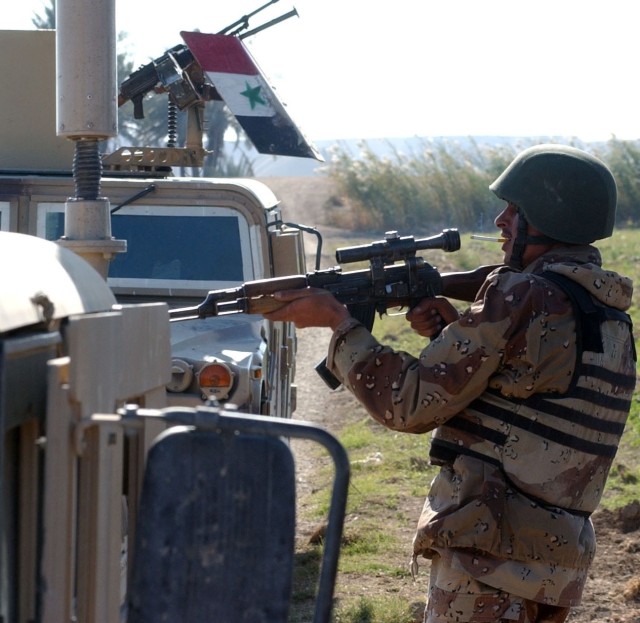WASHINGTON (American Forces Press Service, Dec. 19, 2006) - The improvements in the Iraqi security forces over the next six months will be dramatic, Lt. Gen. Martin Dempsey said today.
Dempsey, the commander of Multinational Security Transition Command Iraq, spoke via teleconference from Baghdad.
He said the Iraqi security forces will reach their manning goals this month. But the quality of the soldiers and police will increase as more intensified training kicks in.
"There are lead times in procurements and things and even in training, and those things will come to fruition here in the first six months of this next year," he said.
In June 2007, all 10 army divisions will be under the control of the Iraqi Ground Forces Command. "They will be in receipt of additional armored protected mobility," Dempsey said.
The Iraqis will soon receive 16 helicopters. For the first time the Iraqis can start flying their own medical evacuation and transport missions, Dempsey said. The Iraqi security forces will also have their own vehicles to clear streets of roadside bombs.
The Iraqi government has set aside $1.5 billion for military sales. "They're now beginning to engage us with the desire to purchase and procure more modern weaponry," Dempsey said. "In particular they're immediately interested in U.S. personal weapons - that's rifles and machine guns and such."
Multinational Forces Iraq officials in Baghdad said the coalition training teams now embedded with all Iraqi units will concentrate on teaching Iraqi commanders and staffs how to plan and execute operations, how to gather intelligence and then act upon it, and how to direct units in the field, they said.
The Iraqis will also concentrate on cooperation between the ministry of defense and the interior, officials said.
The size and composition of the coalition embedded training teams will probably change, Dempsey said.
"I think that growing the size of the transition teams makes a great deal of sense, and also changing their composition," he said. "If you think about it, when we started down this path of embedding transition teams, the Iraqi security forces were not very well developed, and so we had kind of a minimal approach to the embedded transition teams and we maximized the approach of having a partner unit with it.
"Now the Iraqi forces are becoming more capable, and it's my view, and I think it will be our view, that we should probably at this time reverse the paradigm," he continued. "We should enhance the transition teams and minimize our partnership with them so that they get used to standing on their own. And I think that's where we're headed."
<b>Coalition should not give up on Iraq</b>
"There are more forces trying to unite Iraq than are trying to pull it apart," said Dempsey.
"So long as they don't give up on themselves, we won't give up on them," the commander of Multinational Security Transition Command Iraq told Pentagon reporters during a teleconference.
"Iraqi security forces will reach their goal of 325,000 trained and equipped members this month," he said. As of Dec. 13, the Iraqi Interior Ministry forces numbered about 188,300 while the Defense Ministry had about 134,700.
But these forces, while effective, need more training, Dempsey said. He said that 2007 will be a year where the coalition will help the Iraqi forces become more capable.
"In particular, we will focus on intelligence, logistics and leaders," Dempsey said.
Prime Minister Nouri al-Maliki has announced that the Iraqi army must grow by 19,000 soldiers. This means another 20 battalions, five brigade headquarters and three division headquarters. This growth will allow Iraqi commanders to place additional forces in the the most heavily contested provinces, Dempsey said. The increase will also allow commanders "to pull units off line from time to time to rearm, refit and retrain."
The prime minister wants the Iraqi army to be more responsive and deployable. "We've helped the minister of Defense develop a plan to form an operational reserve that will be functional and deployable throughout Iraq in early 2007," Dempsey said.
The Iraqi government is funding the manpower increase, Dempsey said, and that in itself is important. "The significance of this is that the security ministers are beginning to take financial responsibility for equipping their own security forces," he said.
Iraqi leaders are reaching out to take control of the country's security, Dempsey said. This is all part of the transitions occurring throughout the country, as coalition forces turn over responsibility to Iraqi forces.
"Transitions from our control to theirs are occurring almost every day, in things as visible to you as control of battlespace and as invisible, but just as important, as financial responsibility for life-support contracts, management of the training base and distribution of fuel and ammunition," Dempsey said.
Dempsey said his command is working closely with Interior Ministry officials to train and, in some cases, reform the police. Coalition personnel are mentoring Iraqi personnel at the ministry level, and the Iraqis are cracking down on corruption and disloyalty in the ministry itself, said Multinational Forces Iraq officials in Baghdad.
Interior officials also called for whole national police brigades to be retrained. This so-called "re-bluing" of the police was intended to get rid of corrupt leaders and to give police more professional skills.
On a more tactical level, coalition personnel are working to reform selected police stations, beginning with Baghdad, Dempsey said. All of these efforts have the idea of increasing police capabilities and addressing the problems of militia influence in the police, the general said.
The interior and defense ministers understand that they have to assess and address the loyalty of their forces, Dempsey said.
"Transitions are always challenging, and these transitions are especially challenging," the general said. "But it's vital that we continue to acknowledge and encourage the desire of Iraq's civilian, military and police leaders to take charge."


Social Sharing